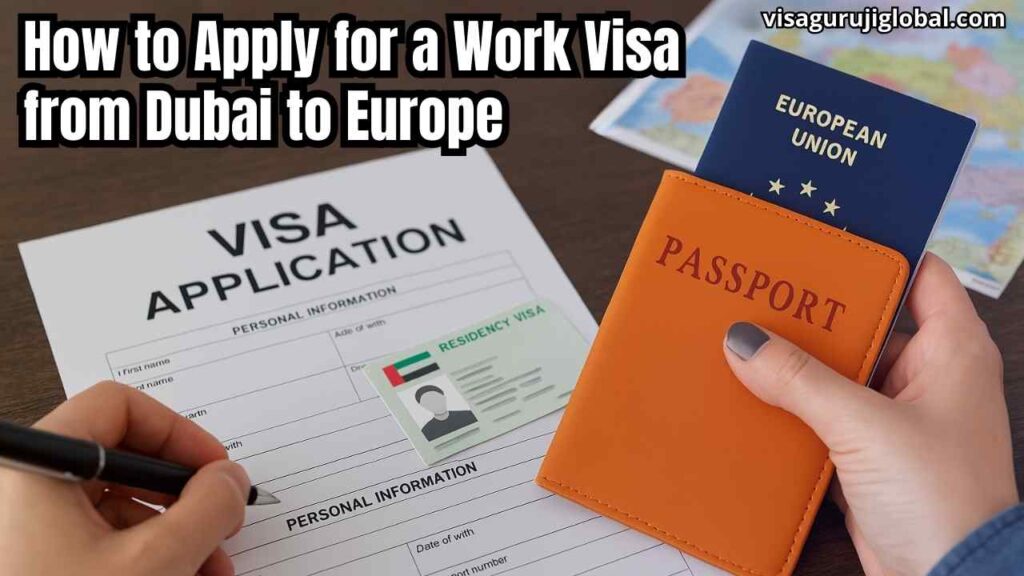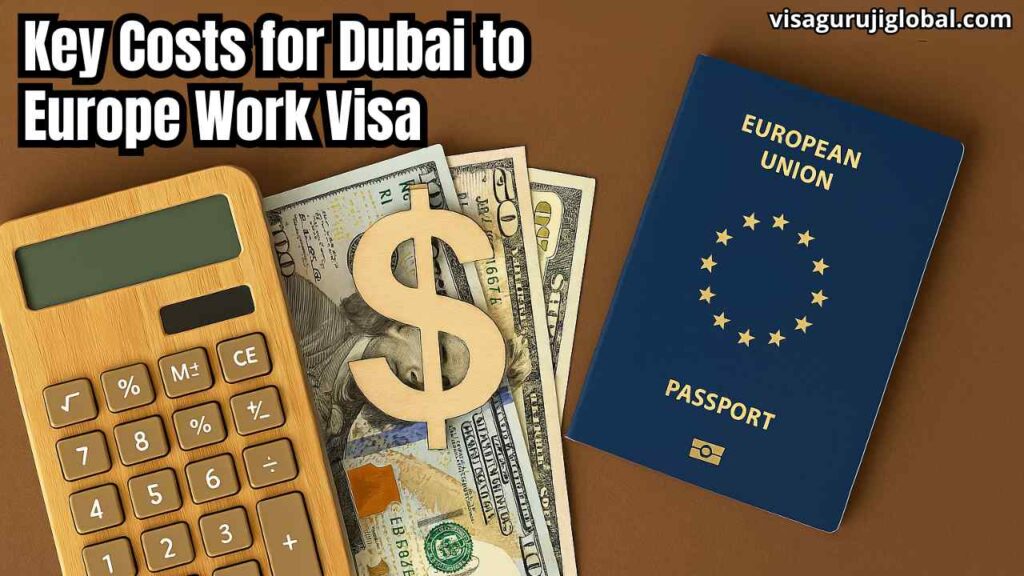Introduction
Dreaming of working in Europe while living in Dubai? You’re not alone. Every year, thousands of professionals search for ways to land a job in Europe and relocate for better opportunities. If you’re one of them, understanding the process and cost of getting a Dubai to Europe work visa is essential. It’s not as straightforward as booking a flight; this journey involves legal documentation, job offers, embassy interviews, and often, multiple costs. But don’t worry — this guide breaks everything down for you in simple terms.

How to Apply for a Work Visa from Dubai to Europe
The first thing you need to know is that Europe doesn’t have one single work visa. Each Schengen or EU country issues its own national work permits. So if you’re aiming to work in Germany, France, Netherlands, Sweden, or Italy, the process will differ slightly based on local laws. However, the basic structure is similar: you need a job offer, a work contract, and approval from the country’s labor authority before you apply at the embassy in Dubai.
You’ll need to secure a job before applying. Most employers in Europe must prove they couldn’t find a suitable local candidate, especially for roles not in the shortage list. Once the job offer is in hand, your employer or you will submit documents to get pre-approval. After that, you’ll be asked to attend a visa interview at the respective consulate in Dubai.
What Documents Are Required?
Before applying for a Dubai to Europe work visa, make sure your documentation is 100% accurate. Incomplete or incorrect documents can lead to immediate rejection. Here’s what you’ll generally need:
-
Valid Passport (with at least 6 months validity)
-
Job Offer Letter/Contract from a European employer
-
Academic and Professional Certificates
-
Proof of Work Experience
-
Medical Certificate (sometimes country-specific)
-
Police Clearance Certificate from UAE
-
Visa Application Form (country-specific)
-
Passport-size Photos as per embassy guidelines
You might also need proof of accommodation, a travel itinerary (for initial travel), and financial documents showing you can sustain yourself if needed. Be aware that translations of documents into the local European language (like German or French) might be required.

Key Costs for Dubai to Europe Work Visa
Here’s a comprehensive breakdown of the expenses involved in moving from Dubai to Europe for work:
-
Visa Application Fee (AED 300–600): Depending on the country, work visa fees vary. For instance, Germany charges around AED 320 while the Netherlands may go up to AED 550.
-
Document Translation & Attestation (AED 250–1000): Degrees and professional certificates often need legal attestation and translation, especially if you’re applying to countries like Germany, France, or Italy.
-
Health Insurance (AED 250–700): Most European work visas require proof of health insurance until your employer-provided coverage kicks in. Costs vary by country and provider.
-
Flight & Accommodation Before Work Starts (AED 2000+): Some employers cover this, but if not, you’ll need to arrange initial lodging and your own airfare.
-
Medical & Police Certificates (AED 300–500): These official documents are mandatory for many visa applications and require appointments, government fees, and occasionally attestation.
Which European Countries Are Best for Dubai Expats?
Some European countries are more welcoming to skilled expats from Dubai, especially in tech, healthcare, and engineering. Germany, Ireland, and the Netherlands are leading the way with talent shortages in multiple industries. For example, Germany’s Blue Card system fast-tracks professionals with high qualifications and job offers with minimum salary requirements.
Countries like Portugal and Spain also offer work visas with relatively simpler procedures if you’re entering the hospitality, agriculture, or tourism sectors. Moreover, France and Italy often have yearly quotas for non-EU work permits, so applying early in the year increases your chances.
Top Europe Destinations from Dubai for Jobs
Let’s look at some popular choices for work visas from Dubai to Europe:
-
Germany (Blue Card): Ideal for engineers, IT professionals, and medical staff. High salary threshold but fast processing.
-
Netherlands (Highly Skilled Migrant Program): Offers work permits to professionals earning a competitive salary. English-speaking work environment.
-
Ireland: Booming tech and finance industries. No language barrier for English speakers. Visa processing is relatively smooth.
-
Portugal: Great for hospitality, agriculture, and digital nomads. Lower cost of living and decent work visa access.
-
Sweden: Known for innovation and tech. Offers work permits if the job is advertised and no local candidate qualifies.
What to Expect After Getting the Work Visa?
Once your Dubai to Europe work visa is approved, you’ll receive a visa sticker on your passport valid for entry. But that’s just the beginning. Upon arrival in Europe, you’ll need to register with local authorities, get your residence permit card, and sometimes pass health or integration courses (depending on the country). Employers usually assist in this, but having an idea beforehand saves stress.
Also, some countries require you to show proof of ongoing employment within a few months. Failing to comply can lead to visa cancellation or renewal issues. Hence, staying updated on your host country’s immigration rules is vital for long-term success.
Also Read: Europe Work Visa from Dubai: Costs & Tips 2025
Conclusion
Applying for a Dubai to Europe work visa can be life-changing — offering better salaries, work-life balance, and new cultural experiences. But the process isn’t overnight. It takes proper planning, job hunting, paperwork, and financial readiness. Knowing the visa fees, documentation requirements, and choosing the right country can significantly increase your chances of success.
Whether you’re a seasoned professional or just starting out, Europe is full of opportunities. Start your journey today by researching the right destination, brushing up your CV, and preparing your application in advance. The sooner you begin, the closer you are to landing that dream job abroad.
FAQ About Dubai to Europe Work Visa
Q1: How to get a Europe work visa from Dubai?
Ans: Apply through the embassy of your desired European country with a valid job offer, required documents, and proof of qualifications.
Q2: Can I get a Europe visa from Dubai?
Ans: Yes, Dubai residents can apply for various types of European visas, including tourist, work, or study visas, through respective embassies.
Q3: How to migrate from Dubai to Europe?
Ans: Migration typically requires securing employment, meeting visa eligibility, and applying through legal channels like work permits or skilled migration.
Q4: Which Europe country is easy to get a visa from Dubai?
Ans: Countries like Spain, Greece, and Portugal are known for relatively easier visa processes for UAE residents, especially for tourism or study.

